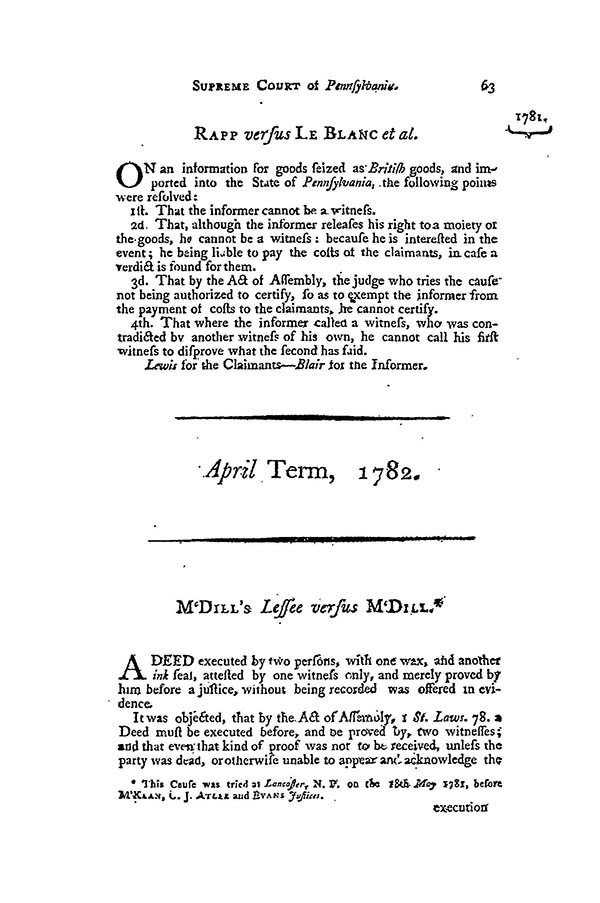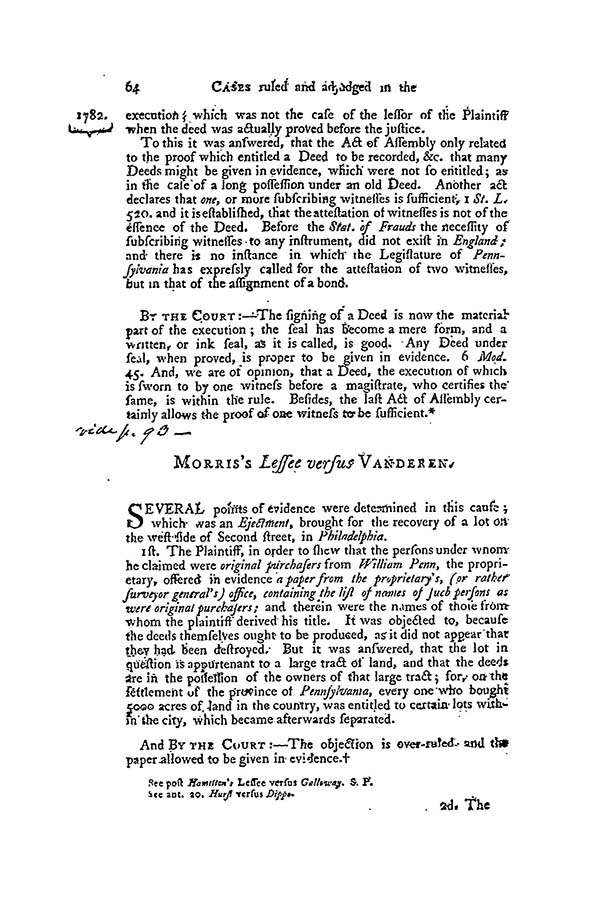Rapp v. Le Blanc, 1 Dall. 63 (Pa. 1781) and McDill's Lessee v. McDill, 1 Dall. 63 (Pa. 1782)
Supreme Court of Pennsylvania
September Term, 1781
Rapp versus Le Blanc et al.
On an information for goods seized as British goods, and imported into the State of Pennsylvania, the following points were resolved:
1st. That the informer cannot be a witness.
2d. That, although the informer releases his right to a moiety or the goods, he cannot be a witness: because he is interested in the event; he being liable to pay the costs of the claimants, in case a verdict is found for them.
3d. That by the Act of Assembly, the judge who tries the cause not being authorized to certify, so as to exempt the informer from the payment of costs to the claimants, he cannot certify.
4th. That where the informer called a witness, who was contradicted by another witness of his own, he cannot call his first witness to disprove what the second has said.
Lewis for the Claimants—Blair for the Informer.
Citation: Rapp v. Le Blanc, 1 U.S. 63, 1 Dall. 63 (Pa. 1781)
Supreme Court of Pennsylvania
April Term, 1782
M'Dill's Lessee versus M'Dill*
A deed executed by two persons, with one wax, and another ink seal, attested by one witness only, and merely proved by him before a justice, without being recorded was offered in evidence.
It was objected, that by the Act of Assembly, 1 St. Laws. 78. a Deed must be executed before, and be proved by, two witnesses; and that even that kind of proof was not to be received, unless the party was dead, or otherwise unable to appear and acknowledge the
To this it was answered, that the Act of Assembly only related to the proof which entitled a Deed to be recorded, &c. that many Deeds might be given in evidence, which were not so entitled; as in the case of a long possession under an old Deed. Another act declares that one, or more subscribing witnesses is sufficient, 1 St. L. 520. and it is established, that the attestation of witnesses is not of the essence of the Deed. Before the Stat. of Frauds the necessity of subscribing witnesses to any instrument, did not exist in England; and there is no instance in which the Legislature of Pennsylvania has expressly called for the attestation of two witnesses, but in that of the assignment of a bond.
By the Court:—The signing of a Deed is now the material part of the execution; the seal has become a mere form, and a written, or ink seal, as it is called, is good. Any Deed under seal, when proved, is proper to be given in evidence. 6 Mod. 45. And, we are of opinion, that a Deed, the execution of which is sworn to by one witness before a magistrate, who certifies the same, is within the rule. Besides, the last Act of Assembly certainly allows the proof of one witness to be sufficient.*
Citation: M'Dill's Lessee v. M'Dill, 1 U.S. 63, 1 Dall. 63 (Pa. 1782)


Last modified: December 11, 2014